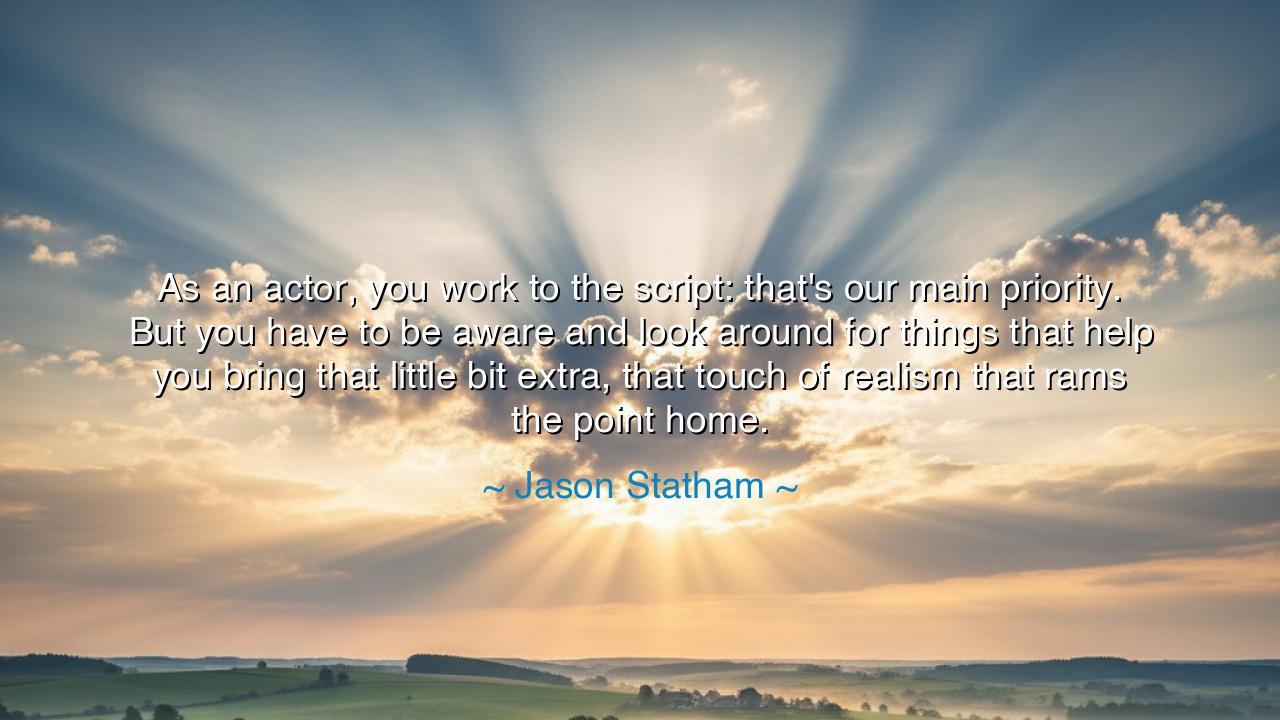
As an actor, you work to the script: that's our main priority.
As an actor, you work to the script: that's our main priority. But you have to be aware and look around for things that help you bring that little bit extra, that touch of realism that rams the point home.






In the craft of performance, a stern yet generous law is spoken: the actor must work to the script—for the script is the covenant, the map, the scaffold on which meaning is raised. This is the main priority, the first vow: honor the line, keep the measure, carry the tale cleanly from mouth to ear. But under this law hums another, whispered by veterans in dim wings and by teachers with ink-stained thumbs: be aware, look around, and glean the small, living details that the page cannot hold. These are the crumbs that lead an audience through the forest of make-believe to the clearing of truth.
For the page is compass, not country. If the actor clings only to the ink, the performance may be accurate and yet thin, like a banner without wind. To look around is to steal fire from the ordinary: the scuff on a boot, the way a tired hand closes a door, the pause before a lie. Such gleanings are the little bit extra, the hidden yeast that makes the dough rise. They are the touch of realism that wakes the sleeper in the seats and rams the point home—not with noise, but with recognition.
The ancients hinted at this union of law and life. In the old theaters of Hellas, masks were codex and chorus, but the masters also studied how fishermen knotted their nets and how mourners tore their garments. They carried these truths upon the stage, and the painted faces seemed to breathe. So too must we: hold the script like a lyre—faithful to its strings—yet tune it by the pitch of the world, so the note you strike vibrates in the listener’s own ribs.
Consider a tale from our more recent pantheon. Before filming Taxi Driver, Robert De Niro took a city license and drove cabs in New York. The script already held Travis Bickle’s hunger and ache, but the night wind added grit: the way coins stick to a palm with sweat; the way neon thrums against a windshield at 3 a.m.; the way a driver watches a rearview mirror with half his soul. None of this was a betrayal of the page. It was fealty to its spirit—the touch of realism that made the character’s solitude audible, that rammed the point home without a speech.
Yet beware the ditch on either side of the road. On one edge yawns idolatry of text: sterile, dutiful, forgettable. On the other sprawls chaos, where the actor abandons the main priority and drowns the scene in improv and ornament. Wisdom walks the ridge: the script is the spine; reality is the flesh. You do not replace the bones; you clothe them. You do not invent storms; you study rain until your sleeves remember it.
Let this be the teaching we pass down: begin with reverence, complete with witness. Read for sense, then live for sense—visit the workshop if you play a carpenter, the ward if you play a nurse, the dock if you play a smuggler at dawn. Keep a field journal; hoard gestures the way a miser hoards coins. When the moment comes, spend only what serves the story. In this discipline, humility and daring shake hands.
Rites for practice: (1) On first read, mark the script for objective, obstacle, and action—this anchors the main priority. (2) In rehearsal, assign yourself “awareness walks”: twenty minutes gathering one behavior, one texture, one sound; bring them back to the scene as the little bit extra. (3) Build a prop liturgy—hold the tools your character holds until your body stops pretending. (4) After each performance, ask one question: “What touch of realism landed tonight?” Keep only what rams the point home; discard the rest. Thus you will honor the page, harvest the world, and give the audience not a lesson but a life.






AAdministratorAdministrator
Welcome, honored guests. Please leave a comment, we will respond soon